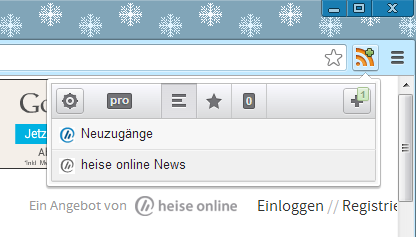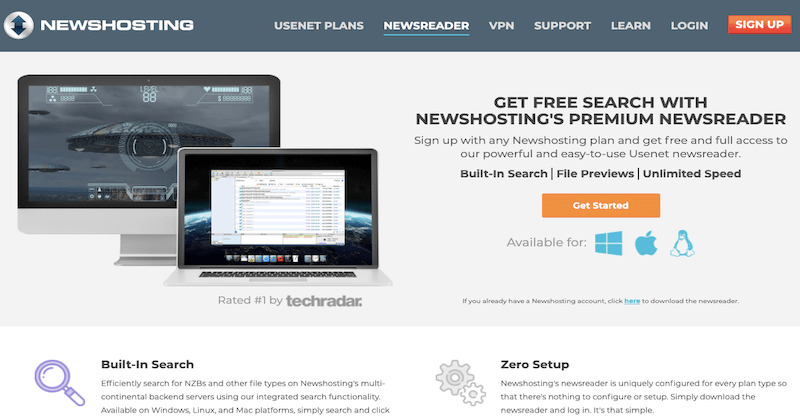| # | Name | Rating | Headers | Win | Mac | Linux |
|---|---|---|---|---|---|---|
| 1 | ||||||
| 2 | ||||||
| 3 | ||||||
| 4 | ||||||
| 5 |
Best Newsgroup Client Software
Below you’ll find a list of our top five newsgroup newsreaders. We have a comprehensive list of newsreaders just below our top recommendations, but our five top picks should meet most everyone’s needs, whether you’re a power user or a complete novice.
A multithreaded Usenet newsreader for GNOME. It is loosely modeled after the Windows program Agent. It features relatively easy decoding of binaries and automatic grouping of multipart posts. It works with servers on non-standard NNTP ports and is configurable for NNTP authorization. It also supports many foreign languages including Spanish, Danish, Japanese, Korean, Polish, and Serbian. This software is compatible with the Mac platform and can be used as a Usenet newsreader. It can handle messages, media, and files and is very easy to navigate. Threaded conversations can be navigated and multiple signatures can be managed. It is possible to block certain posters. 7 Tips for Comparing Newsgroup Readers. Price: Consider how much the software costs. Within the last couple years most of the Usenet clients we recommend have decided to offer free software. Some of top Usenet providers including Newshosting, TweakNews, Easynews, and Giganews provide custom newsreaders to their members.
RSSOwl is a powerful application to organize, search and read all your news feeds in a comfortable way. Feedly, Reeder, and Safari are probably your best bets out of the 14 options considered. 'Multi-platform RSS Monica' is the primary reason people pick Feedly over the competition. This page is powered by a knowledgeable community that helps you make an informed decision.
If you are a newcomer to USENET, scroll below the listings to read more about how news readers work. Keep in mind that many of our Top Five USENET Providers for 2021 offer their own software and, if that’s the case, you always have the option of going with their included software instead of downloading a different newsreader to use their service.
Newshosting
- Very Stable And Easy
- Highly Configurable
- Integrated Search Feature.
Finding binaries is easy on this newsreader and, once you do find what you’re looking for, you’ll see the real power of Newshosting’s newsreader. You can preview files before you download them and, when you do download them, the newsreader handles all the file unpacking and repair functions automatically. Hands down, this is a great newsreader, and just one of the reasons we’re so fond of Newshosting’s service.
NZBGet
- Completely Free
- Fast on small devices
- Best Choice for NAS Devices
NZBGet is fast; very fast. It can also download binaries for you automatically, which is another reason to give this great program a try. Like our other top choices, NZBGet is great for beginners and power users alike. It’s powerful enough to handle complex jobs like serving as a media server, and it automatically handles files that you download, making it that much easier for novices to enjoy the content they download without any hassles.
Newsbin
- First newsreader to support NZB format
- Auto download and repair RAR files
- Free 10-day trial
The Newsbin search service is subscription based, but well-worth the price, particularly if your USENET service doesn’t offer one of their own.
Newsleecher
- Free 14-day trial period
- Great looking interface
- Highly Customizable
Like Newsbin, this program only works on the Windows platform. Nonetheless, it’s features and, in particular, it’s ease of use, merit its inclusion on this list.

SABnzbd
- In 16 Languages
- Security via SSL and IPv6.
- Browser support integrated
SABnzbd will run on any system that supports the Python programming language, so, no matter what OS you’re running on your desktop, SABnzbd is likely to be compatible with it. If you want to integrate your downloader with other sites so you can automatically download binaries when they become available, this is a great choice and we highly recommend it!
How We Rank Newsreaders
We look at several different criteria when we rank newsreaders and, in the interest of being transparent with our readers, here they are.
Price: We take price into account. Many newsreaders are open-source projects, so they’re completely free. Some come with USENET services and are value-added products in that regard. Others, like Newsbin, do cost money, but are worth it if they made this list. Some good newsreaders that come included with USENET subscriptions include Newshosting, as listed above, and Easynews.
Search Capabilities: This is an important feature, and good search capabilities go a long way with us in determining whether a newsreader belongs on our list of top choices or not. Newshosting and Newsleecher are particularly good in this regard.
OS Compatibility: We like products that are flexible, so you’ll see more than one entry on this list that’s notable for its cross-platform operability. NZBGet and SABnzbd are the standouts in OS compatibility.
Multiple News Services: We like to give our readers choices, and we take that into account when ranking newsreaders. Those newsreaders that allow you to connect to any service are likely to rank highly on our list, as reflected in our choices above.
Integration: One of the best things about USENET is the sheer number of programs available that help you get the most out of it. Couchpotato and Sonarr are good examples of such programs. All of our top five picks listed above have some level of interoperability with popular downloaders.
Headers Compatibility: We take this into account because not all newsreaders allow you to download headers, and it’s a valuable feature for some of our users. That being said, some programs, such as NZBGet and SABnzbd don’t offer this feature, but are still great programs, nonetheless.
Ease of Use: Our top five newsreaders are all easy to use, and we think it’s important to consider that when ranking newsreaders in general. Newshosting is a standout for ease of use. Easynews doesn’t appear on our list, but we highly recommend it for people who want a more web-based experience.
SSL Connections: Security matters. SSL connections are pretty standard these days, and we like to make sure we recommend newsreaders that are compatible with this important privacy feature.
Additional Automation Features: USENET is very automated these days and we want our readers to be able to take advantage of that. To that end, we tend to recommend newsreaders that handle everything, from downloading binaries, to unpacking them, to repairing them if need be.
NZB Import: Not all newsreaders work with NZB files, and we like to recommend the ones that do, because NZB files really make USENET a lot more convenient. NZBs haven’t been around as long as some of these newsreaders, but all of our top recommendations support them.
| Name | Win | Mac | Linux | Headers | Price |
|---|---|---|---|---|---|
| Free w/ service | |||||
| $20/yr | |||||
| $3.99/mo | |||||
| Free | |||||
| Free | |||||
| Free | |||||
| Free | |||||
| Free | |||||
| Free | |||||
| Optional donation | |||||
| $9.99 | |||||
| Free | |||||
| free | |||||
| $12.50/yr | |||||
| Free | |||||
| Free | |||||
| €29.98 | |||||
| free | |||||
| free | |||||
| $36.00 | |||||
| Free | |||||
| $3.99 | |||||
| $29 for new registrants, discounts available | |||||
| free | |||||
| free | |||||
| $18.00 | |||||
| free | |||||
| free | |||||
| Free | |||||
| Free | |||||
| free | |||||
| free | |||||
| free | |||||
| $59.95/yr | |||||
| Free | |||||
| Free | |||||
| free | |||||
| Depends on the Usenet provider | |||||
| $16.85/mo | |||||
| Free | |||||
| $35 | |||||
| $49.95 | |||||
| Free | |||||
| $25.00 | |||||
| $29.95 | |||||
| $14.95 | |||||
| $6.95 |
These free Usenet news readers allow you to connect to NNTP servers to read and post Usenet articles. Most of the software havespecial facilities designed to handle binary files (pictures, music files, video files) found on some newsgroups, including the abilityto decode them, automatically handle multi-part posts, save the files, automatically resume download of a partially downloaded multi-partpost, and so on. They also include message filters, so that you don't have to view annoying posts or cross-posts, the ability to viewmessages using a threaded view, so that you can easily follow a discussion on a specific topic, and so on.
Note that although they use the same terminology ('news'), these Usenet newsreaders are different from the RSS and ATOM feed newsreadersfound on the Free Offline News Feed Readers andNews Aggregators page. Those handle the RSS feeds such as those you can find onthefreecountry.com and thesitewizard.com,allowing you to keep track of updates and additions on websites. Usenet news readers, on the other hand, allow you to participate inforum-like discussions (etc) in the Usenet newsgroups.
You may also wish to know that certain web browsers, like Opera, come with the ability to read/postUsenet articles built-in. Furthermore, certain email clients, such as Thunderbird listed on theFree Email Clients page, also allow you to read/postsuch articles. However, in general, these built-in facilities usually do not have the large feature-set and convenience features that thespecialized Usenet clients listed here provide.
Related Pages
Free Usenet NTTP News Clients
XanaNews is a free, open source Usenet news reader forWindows.It supports multiple news servers (NNTP servers), threaded multi-column tree message display,the ability to save images and binary attachments, the ability to decode UUE, Base64, and yEncoded messages,message deletion feature that allows you to delete messages that don't match your criteria,the highlighting of threads with messages to you, the ability to cancel and resume an operation, batch mode operations, message filters,SSL support, integrated spell checker, etc.
This is a binaries news reader for Linux that handles the joining of multi-part posts, automatic decoding of posts, support formultiple servers, multiple download threads per server, download queue management (to pause, resume, cancel downloads, etc), etc.
Gnus is a message reader running under GNU Emacs (seethe Free Programmer's Editors page),that supports reading and composing news and email. It is provided in source code form.

This is an open source Usenet news client forWindows. It supports a scoringsystem for its filters, and is customizable.
Usenet Client Mac


Best Newsgroup Reader
Newsgroup Reader Mac Free Download
This old, no longer maintained news reader for Windows 95/NET supports multiple server connectionsand viewing of multiple articles simultaneously. Update: it looks like you can get amore recent version for modern Windows systems (both 32 bit and 64 bit versions). This later version ismaintained by a third party (scroll down the page on that site to find it).
- How to Register Your Own Domain Name - how to get your own domain name
Usenet Reader
It will appear on your page as: